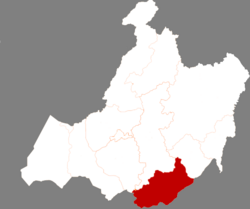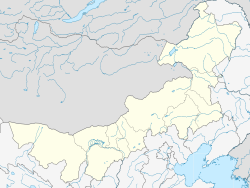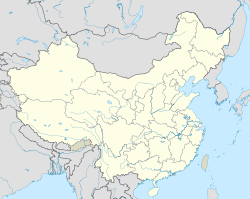Zalantun (Manchu J̌alan Ai"l or Jalan Tun) or Zhalantun (Chinese: 扎兰屯; Mongolian: ᠵᠠᠯᠠᠨ ᠠᠢ᠌ᠯ ᠬᠣᠲᠠ), is a city and administrative division of Hulunbuir Prefecture-level city, Inner Mongolia, China. It is in the northeastern part of Inner Mongolia, in the southeastern foothills of the Greater Khingan mountains, bordering Heilongjiang province to the east. It is an area which has a number of forests and streams, as well as the Yalu River, not to be confused with the Yalu River on the Sino-Korean border. It is known for its hunting and fishing.[citation needed]
Zalantun
扎兰屯市 • ᠵᠠᠯᠠᠨ ᠠᠢ᠌ᠯ ᠬᠣᠲᠠ Cha-lan-t'un | |
|---|---|
 | |
| Nickname: | |
 Zalantun in Hulunbuir | |
| Coordinates: 48°01′37″N 122°42′29″E / 48.027°N 122.708°E | |
| Country | China |
| Autonomous region | Inner Mongolia |
| Prefecture-level city | Hulunbuir |
| Municipal seat | Xinghua Subdistrict |
| Area | |
| 16,800.0 km2 (6,486.5 sq mi) | |
| • Urban | 385.00 km2 (148.65 sq mi) |
| Population (2020)[2] | |
| 318,933 | |
| • Density | 19/km2 (49/sq mi) |
| • Urban | 134,400 |
| Time zone | UTC+8 (China Standard) |
| Postal code | 162650 |
| Area code | 0470 |
| Website | www |
| Zalantun | |||||||
|---|---|---|---|---|---|---|---|
| Chinese name | |||||||
| Traditional Chinese | 扎蘭屯 | ||||||
| Simplified Chinese | 扎兰屯 | ||||||
| |||||||
| Mongolian name | |||||||
| Mongolian Cyrillic | Жалан-Айл хот | ||||||
| Mongolian script | ᠵᠠᠯᠠᠨ ᠠᠢ᠌ᠯ ᠬᠣᠲᠠ | ||||||
| |||||||
History
editZalantun was formerly known as Butha (布特哈; Bùtèhā), and the city was made into an administrative centre in the Kangxi era. In 1929, Buteha was renamed as Yalu county (雅鲁县; Yǎlǔ Xiàn) because the Yalu River runs through it, but in 1933 it became the Zalantun Banner (扎兰屯旗; Zhālántún Qí). In 1983, Zalantun ceased to be a banner and became a part of Hulunbuir, remaining so today.
Administrative divisions
editZalantun is made up of 7 subdistricts, 8 towns, 1 township, and 3 ethnic townships.
| Name | Simplified Chinese | Hanyu Pinyin | Mongolian (Hudum Script) | Mongolian (Cyrillic) | Administrative division code |
|---|---|---|---|---|---|
| Subdistricts | |||||
| Xinghua Subdistrict | 兴华街道 | Xīnghuá Jiēdào | ᠰᠢᠩ ᠬᠤᠸᠠ ᠵᠡᠭᠡᠯᠢ ᠭᠤᠳᠤᠮᠵᠢ | Шин ухаа зээл гудамж | 150783001 |
| Zhengyang Subdistrict | 正阳街道 | Zhèngyáng Jiēdào | ᠵᠧᠩ ᠶᠠᠩ ᠵᠡᠭᠡᠯᠢ ᠭᠤᠳᠤᠮᠵᠢ | Жен ян зээл гудамж | 150783002 |
| Fanrong Subdistrict | 繁荣街道 | Fánróng Jiēdào | ᠹᠠᠨ ᠷᠦᠩ ᠵᠡᠭᠡᠯᠢ ᠭᠤᠳᠤᠮᠵᠢ | Фан рун зээл гудамж | 150783003 |
| Xiangyang Subdistrict | 向阳街道 | Xiàngyáng Jiēdào | ᠰᠢᠶᠠᠩ ᠶᠠᠩ ᠵᠡᠭᠡᠯᠢ ᠭᠤᠳᠤᠮᠵᠢ | Шиян ян зээл гудамж | 150783004 |
| Gaotaizi Subdistrict | 高台子街道 | Gāotáizi Jiēdào | ᠭᠣᠤ ᠲᠠᠢ ᠽᠢ ᠵᠡᠭᠡᠯᠢ ᠭᠤᠳᠤᠮᠵᠢ | Гуутай зи зээл гудамж | 150783005 |
| Tiedong Subdistrict | 铁东街道 | Tiědōng Jiēdào | ᠲᠡᠮᠦᠷ ᠵᠠᠮ ᠤᠨ ᠵᠡᠭᠦᠨᠳ᠋ᠠᠬᠢ ᠵᠡᠭᠡᠯᠢ ᠭᠤᠳᠤᠮᠵᠢ | Дамар замын зүүндэх зээл гудамж | 150783006 |
| Hexi Subdistrict | 河西街道 | Héxī Jiēdào | ᠭᠣᠣᠯ ᠤᠨ ᠪᠠᠷᠠᠭᠤᠨᠳᠠᠬᠢ ᠵᠡᠭᠡᠯᠢ ᠭᠤᠳᠤᠮᠵᠢ | Голын баруунтах зээл гудамж | 150783007 |
| Towns | |||||
| Moguqi Town | 蘑菇气镇 | Mógūqì Zhèn | ᠮᠦᠬᠦᠴᠢ ᠪᠠᠯᠭᠠᠰᠤ | Мөөч балгас | 150783100 |
| Woniuhe Town | 卧牛河镇 | Wòniúhé Zhèn | ᠸᠧ ᠨᠢᠦ ᠾᠧ ᠪᠠᠯᠭᠠᠰᠤ | Ве нүү ге балгас | 150783102 |
| Genghis Khan Town | 成吉思汗镇 | Chéngjísīhán Zhèn | ᠴᠢᠩᠭᠢᠰ ᠬᠠᠨ ᠪᠠᠯᠭᠠᠰᠤ | Чингис хан балгас | 150783103 |
| Dahewan Town | 大河湾镇 | Dàhéwān Zhèn | ᠳ᠋ᠠ ᠾᠧ ᠸᠠᠨ ᠪᠠᠯᠭᠠᠰᠤ | Да ге ван балгас | 150783104 |
| Haoraoshan Town | 浩饶山镇 | Hàoráoshān Zhèn | ᠬᠣᠷᠣᠭᠠ ᠠᠭᠤᠯᠠ ᠪᠠᠯᠭᠠᠰᠤ | Хороо уул балгас | 150783105 |
| Chaihe Town | 柴河镇 | Cháihé Zhèn | ᠴᠠᠢ ᠾᠧ ᠪᠠᠯᠭᠠᠰᠤ | Цай ге балгас | 150783106 |
| Zhonghe Town | 中和镇 | Zhōnghé Zhèn | ᠵᠦᠩ ᠾᠧ ᠪᠠᠯᠭᠠᠰᠤ | Жүн ге балгас | 150783107 |
| Haduohe Town (Had Gol Town) |
哈多河镇 | Hāduōhé Zhèn | ᠬᠠᠳᠤ ᠭᠣᠣᠯ ᠪᠠᠯᠭᠠᠰᠤ | Хад гол балгас | 150783108 |
| Township | |||||
| Wadi Township | 洼堤乡 | Wādī Xiāng | ᠸᠠᠲ᠋ᠢ ᠰᠢᠶᠠᠩ | Вади шиян | 150783203 |
| Ethnic townships | |||||
| Daur Ethnic Township | 达斡尔民族乡 | Dáwò'ěr Mínzúxiāng | ᠳᠠᠭᠤᠷ ᠦᠨᠳᠦᠰᠦᠲᠡᠨ ᠦ ᠰᠢᠶᠠᠩ | Дагуур үндэстэний шиян | 150783200 |
| Oroqen Ethnic Township | 鄂伦春民族乡 | Èlúnchūn Mínzúxiāng | ᠣᠷᠴᠣᠨ ᠦᠨᠳᠦᠰᠦᠲᠡᠨ ᠦ ᠰᠢᠶᠠᠩ | Орцон үндэстэний шиян | 150783201 |
| Samagir Evenk Ethnic Township | 萨马街鄂温克民族乡 | Sàmǎjiē Èwēnkè Mínzúxiāng | ᠰᠠ ᠮᠠ ᠵᠢᠶᠧ ᠡᠸᠡᠩᠬᠢ ᠦᠨᠳᠦᠰᠦᠲᠡᠨ ᠦ ᠰᠢᠶᠠᠩ | Саа ма жье эвэнк үндэстэний шиян | 150783202 |
Climate
editZalantun has a monsoon-influenced humid continental climate (Köppen Dwa/Dwb), with long frigid winters, very warm summers, and short transitional seasons. The monthly mean temperature ranges from −16.5 °C (2.3 °F) in January to 21.7 °C (71.1 °F) in July, while the annual mean is 3.65 °C (38.6 °F). Typifying the influence of the East Asian Monsoon, on average, a majority of the annual 501 millimetres (19.7 in) of precipitation falls in July and August alone.
| Climate data for Zhalantun, elevation 307 m (1,007 ft), (1991–2020 normals, extremes 1971–2010) | |||||||||||||
|---|---|---|---|---|---|---|---|---|---|---|---|---|---|
| Month | Jan | Feb | Mar | Apr | May | Jun | Jul | Aug | Sep | Oct | Nov | Dec | Year |
| Record high °C (°F) | 4.3 (39.7) |
11.7 (53.1) |
22.1 (71.8) |
30.7 (87.3) |
38.0 (100.4) |
40.2 (104.4) |
40.1 (104.2) |
35.2 (95.4) |
35.5 (95.9) |
29.7 (85.5) |
17.0 (62.6) |
5.9 (42.6) |
40.2 (104.4) |
| Mean daily maximum °C (°F) | −10.6 (12.9) |
−5.3 (22.5) |
2.9 (37.2) |
13.1 (55.6) |
21.2 (70.2) |
26.1 (79.0) |
27.9 (82.2) |
25.9 (78.6) |
20.4 (68.7) |
11.2 (52.2) |
−1.3 (29.7) |
−10.0 (14.0) |
10.1 (50.2) |
| Daily mean °C (°F) | −16.3 (2.7) |
−11.9 (10.6) |
−3.7 (25.3) |
6.3 (43.3) |
14.3 (57.7) |
19.8 (67.6) |
22.3 (72.1) |
20.0 (68.0) |
13.4 (56.1) |
4.4 (39.9) |
−7.1 (19.2) |
−15.2 (4.6) |
3.9 (38.9) |
| Mean daily minimum °C (°F) | −20.6 (−5.1) |
−17.0 (1.4) |
−9.4 (15.1) |
−0.3 (31.5) |
7.5 (45.5) |
14.1 (57.4) |
17.5 (63.5) |
15.4 (59.7) |
7.9 (46.2) |
−1.2 (29.8) |
−11.8 (10.8) |
−19.4 (−2.9) |
−1.4 (29.4) |
| Record low °C (°F) | −34.7 (−30.5) |
−34.5 (−30.1) |
−26.7 (−16.1) |
−14.2 (6.4) |
−6.3 (20.7) |
2.8 (37.0) |
8.0 (46.4) |
1.6 (34.9) |
−5.7 (21.7) |
−15.9 (3.4) |
−25.3 (−13.5) |
−34.5 (−30.1) |
−34.7 (−30.5) |
| Average precipitation mm (inches) | 1.7 (0.07) |
2.9 (0.11) |
5.7 (0.22) |
22.5 (0.89) |
40.3 (1.59) |
100.9 (3.97) |
152.9 (6.02) |
132.0 (5.20) |
48.0 (1.89) |
18.5 (0.73) |
5.7 (0.22) |
5.2 (0.20) |
536.3 (21.11) |
| Average precipitation days (≥ 0.1 mm) | 3.1 | 2.5 | 3.8 | 5.8 | 9.0 | 13.8 | 15.1 | 12.9 | 8.9 | 4.7 | 3.4 | 5.2 | 88.2 |
| Average snowy days | 5.8 | 4.4 | 5.8 | 3.9 | 0.3 | 0 | 0 | 0 | 0.1 | 2.6 | 5.5 | 7.9 | 36.3 |
| Average relative humidity (%) | 56 | 50 | 42 | 39 | 43 | 60 | 69 | 71 | 62 | 52 | 55 | 60 | 55 |
| Mean monthly sunshine hours | 188.2 | 216.8 | 269.8 | 264.2 | 275.3 | 247.3 | 239.1 | 239.9 | 239.7 | 228.0 | 176.2 | 158.4 | 2,742.9 |
| Percent possible sunshine | 68 | 74 | 73 | 64 | 58 | 52 | 50 | 55 | 64 | 69 | 64 | 61 | 63 |
| Source: China Meteorological Administration[3][4]</ref> Weather China[5] | |||||||||||||
Economy
editZalantun's economy is based primarily on tourism and agriculture, livestock and forestry. The Harbin-Manzhouli Railway traverses the district. It is rich in food grains, particularly wheat, soy and corn, as well as cattle, sheep, horse and other livestock. It has an industrial base in paper production, candy production, and wool. It has an annual average temperature of 2 °C and an average annual precipitation of 480mm. The northwest portion of the district consists of natural forests in the Greater Khingan mountains.
Transport
editZhalantun Chengjisihan Airport was opened in December 2016.[6]
References
edit- ^ a b Ministry of Housing and Urban-Rural Development, ed. (2019). China Urban Construction Statistical Yearbook 2017. Beijing: China Statistics Press. p. 46. Retrieved 11 January 2020.
- ^ Inner Mongolia: Prefectures, Cities, Districts and Counties
- ^ 中国气象数据网 – WeatherBk Data (in Simplified Chinese). China Meteorological Administration. Retrieved 10 October 2023.
- ^ 中国气象数据网 (in Simplified Chinese). China Meteorological Administration. Retrieved 10 October 2023.
- ^ "扎兰屯 - 气象数据 -中国天气网".
- ^ 内蒙古扎兰屯成吉思汗机场投入使用. Civil Aviation Administration of China (in Simplified Chinese). 28 December 2016.

